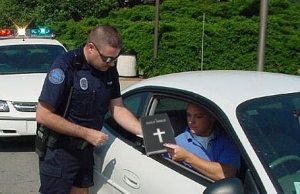The weekly report on religion and politics
by Johnny Monsarrat
Religious Freedom: What Does it Cover?
 The religious freedom argument, having been used in the United States to refuse cake, crafts, and chicken sandwiches to LBGTA people, and then to refuse full healthcare coverage to women, is being used in a variety of creative new ways. In 2012 a religious school was allowed to ignore the Americans with Disabilities Act. Now teachers are using a religious argument to avoid paying union fees.
The religious freedom argument, having been used in the United States to refuse cake, crafts, and chicken sandwiches to LBGTA people, and then to refuse full healthcare coverage to women, is being used in a variety of creative new ways. In 2012 a religious school was allowed to ignore the Americans with Disabilities Act. Now teachers are using a religious argument to avoid paying union fees.
Should a union be given a monopoly to speak for every teacher at a school? Regardless of your views on this, using religion to opt out of obeying laws is a dangerous trend.
In this MSNBC article,┬áReligious Freedom Arguments Used to Weaponize the First Amendment,┬áGeorgetown Law professor Robin West says that the┬ádemands for extralegal treatment create┬áÔÇ£separate sovereignties.ÔÇØ Is this a form of theocracy?┬áWhat’s next, opting┬áout of traffic tickets?
Majority of White Adults in UK Have No Religion
More than half of white adults in Britain have no religion now, a figure that is forecast to rise, according to a new poll by YouGov, the survey component of magazine The Economist.┬á’No religion is the new norm,’ says Professor Linda Woodhead, ‘and there is every indication that its majority share will continue to grow.’ She also says that the trend can be linked to churches┬ábecoming more religious, so that people who are merely spiritual may find themselves preferring to go it on their own.
What is World Religion Day?
 Last Sunday was World Religion Day, founded in the 1950s by the┬áBahaÔÇÖi community, which believes that all religions are basically the same if you squint your eyes hard enough. We wonder whether┬áthey might like to include the religions of the TV show Game of Thrones.
Last Sunday was World Religion Day, founded in the 1950s by the┬áBahaÔÇÖi community, which believes that all religions are basically the same if you squint your eyes hard enough. We wonder whether┬áthey might like to include the religions of the TV show Game of Thrones.
While we don’t embrace ignorance of the differences of religions, we do support interfaith engagement and outreach, especially if it includes nonbelievers. And we might advocate for the logical next step. Perhaps what brings us all together in a shared sense of dreams and values is that we are all human and all have critical thinking skills, not that we are religious.
Read more about World Religion Day.
Proud Faith of US Presidential Candidates
 At a public event in Iowa, an early and thus important US state for showing momentum in the forthcoming presidential election, Republican candidate (and Catholic) Marco Rubio was asked by an atheist whether faith would interfere with his decision-making.
At a public event in Iowa, an early and thus important US state for showing momentum in the forthcoming presidential election, Republican candidate (and Catholic) Marco Rubio was asked by an atheist whether faith would interfere with his decision-making.
Similar questions were asked in the 1960 election, when candidate (and future winner) John Kennedy was the first Catholic to run for US president. Would Kennedy be controlled by the Pope from Rome, or be free to make his own decisions? Implicit in the question was separation of church and state, the idea that no matter how infallible, that government decisions should be made free from religion.
More than 50 years later,┬áthe questioner┬ásaid, ÔÇ£atheists like me are looking for somebody that will uphold their rights as Americans, and not pander to a certain religious group.” This was in response to a religious advertisement where Rubio┬áspoke about his faith earnestly.┬áRead Rubio’s reply.
Meanwhile, US presidential candidate┬áDonald Trump can’t portray┬áa strong faith as well as he would like to, and an article in the Times of Israel declares that Democratic US presidential candidate┬áBernie Sanders’ religion is a non-issue for Iowa voters.
Obama Says No to Religious Discrimination
Although US presidential candidates were not specifically named, those who like Donald Trump support discrimination against Muslims were shamed in President Obama’s annual State of the Union address to Congress. He said, “we need to reject any politics — any politics — that targets people because of race or religion. Let me just say this. This is not a matter of political correctness. This is a matter of understanding just what it is that makes us strong. The world respects us not just for our arsenal; it respects us for our diversity, and our openness, and the way we respect every faith.”
And those with no faith, right?
Sunni-Shia War of Religion?
To what extend is the tension and wars of the Middle East a religious fight between the two major branches of Islam, Sunni Islam and Shia Islam? An article in the Zimbabwe Independent explores this in,┬áThe Islamic Wars of Religion. (And here’s why it’s not much like the split between Catholic and Protestant Christians).
